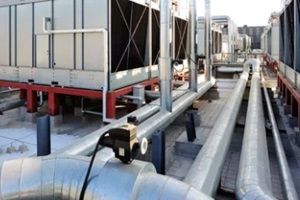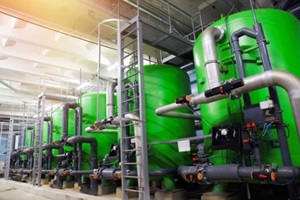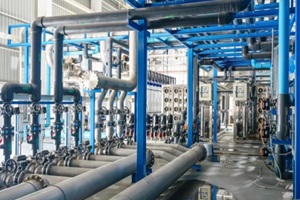 Glycol use in HVAC systems is common practice for facilities in the Northeast, and keeping them running efficiently requires specialized expertise. For chief engineers, mechanical contractors, and building managers overseeing these systems, lack of oversight and maintenance could result in tenant complaints, costly repairs, or even mechanical failures.
Glycol use in HVAC systems is common practice for facilities in the Northeast, and keeping them running efficiently requires specialized expertise. For chief engineers, mechanical contractors, and building managers overseeing these systems, lack of oversight and maintenance could result in tenant complaints, costly repairs, or even mechanical failures.
This article details why it’s essential to monitor, test, and maintain glycol, and how a water treatment professional can help when it is time to drain, clean, and refill your system.
Understanding Glycol Systems
Glycol HVAC systems circulate an ethylene or propylene glycol and water mix through closed piping loops to enable efficient heating and cooling. With freeze points reaching as low as -60°F, glycol prevents frozen pipes and expanded cooling capacity versus water-only systems.
Correct glycol concentration is vital for ideal heat transfer properties. These systems require ongoing contamination prevention to avoid reduced performance, corrosion damage, and downtime issues. The most efficient way to get a regular understanding of glycol concentration, or more details on chemical makeup of water is to have regular quarterly glycol testing or even lab testing.
Need for Regular Cleaning and Maintenance
Over time, glycol systems can accumulate contaminants such as rust, scale, and biological growth. These contaminants can arise from various sources, including system corrosion, water impurities, and degradation of the glycol itself.
During operation, glycol mixes face breakdown and contaminant buildup problems including:
- Rust scale accumulation inhibiting heat transfer, and driving up energy consumption. This costs facilities more in utility bills and frustrates tenants.
- Oxygen and chloride corrosion eroding system piping and components. This leads to leaks or total component failure.
- Glycol chemical decomposition causing acid formation – further corrosion risks.
Without mitigation measures, contamination subjects glycol HVAC infrastructure to accelerated wear-and-tear. Equipment failures translate into tenant disruptions and expensive emergency contractor repairs.
Trust the Pros for Safe, Effective Glycol Cleaning
Corrective cleaning for contaminated systems involves:
 Chemical flushing to remove loose sediment
Chemical flushing to remove loose sediment- Powerful detergent circulation to dissolve scale deposits
- Ph verification and inhibitor testing for safety
- Precision glycol concentration calibration
Attempting hazardous chemical “pump and dump” style services without training poses significant technician and equipment safety hazards. Water treatment experts have the tools, methods, and experience to restore glycol integrity without infrastructure risk.
Ongoing System Care Through Proactive Partnerships
Beyond corrective cleaning, glycol HVAC systems require regular maintenance for peak operation including:
- Routine system sampling to analyze pH, glycol percentages, and contaminant levels before functionality suffers
- Visual inspections around piping and major components to spot potential leak points
- Minor repairs like gasket replacements, catching issues while still manageable
- Scheduled flushes and inhibitor “booster” shots on a 1-3 year cycle depending on system size and facility use patterns
For busy facility administrators without water treatment specialization, managing these responsibilities in-house proves difficult. Partnering with professional services simplifies the process.
Reap the Benefits of Properly Maintained Glycol Systems
Working with experienced water treatment providers to optimize glycol HVAC yields facilities:
- Reduced tenant complaints through consistent cooling capacity
- Lower utility costs from finely tuned, efficient equipment
- Avoiding 5 and 6-figure unplanned equipment replacement costs
- Prolonged system lifespan through corrosion mitigation
- Documentation for management showing HVAC care investments
Specialized technicians act as the insider experts to maximize uptime and savings. They provide system insights facility administrators may lack while allowing management teams to focus time, money, and personnel on core operations.
The Safe Choice for Glycol System Responsiveness

Glycol HVAC provides facilities with reliable and expanded heating/cooling capabilities – when properly maintained with professional water treatment. Partnering with certified specialists grants peace of mind that systems operate safely, efficiently, and sustainably across changing seasonal demands.
Reach out to discuss tailoring a water treatment plan focused on peak glycol system performance for your facility. Specializing in comprehensive water treatment solutions, Tower Water is your one-stop provider for all water treatment needs, including glycol system cleaning.
We invite you to experience the Tower Water difference for yourself. Whether you’re facing specific challenges with your glycol system or seeking preventive maintenance, our experts are ready to provide tailored solutions to meet your building’s specific needs.
Check out other helpful insights here, or contact Tower Water today at 1-(212)-518-6475 or online to learn more about exactly why we’re the perfect partner to handle your glycol system’s cleaning needs.
